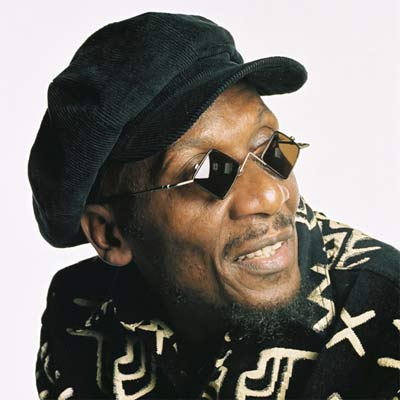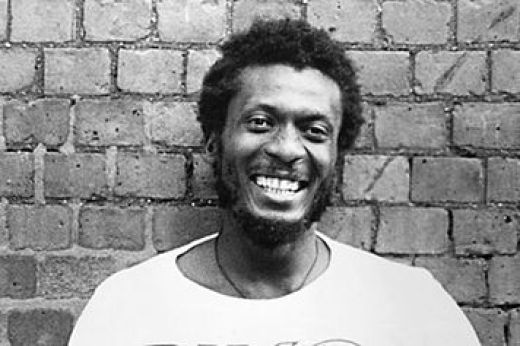15 Years After Bob Marley, A Second Reggae Artist Is In The Running
“Very few single albums can be said to have changed music forever,” reads the official Rock & Roll Hall of Fame ballot entry for Jimmy Cliff, who’s in the running to be inducted in 2009, the 25th year of the Hall’s existence. “Jimmy Cliff’s The Harder They Come is one. The album—and the movie that spawned it—introduced reggae to a worldwide audience and changed the image of the genre from a cruise ship soundtrack to music of inspiration and rebellion.”
Jimmy Cliff’s competition runs the gamut from girl group to art rock to disco to rap to punk to pure pop: Abba, The Chantels, Genesis, The Hollies, Kiss, LL Cool J, Darlene Love, Laura Nyro, Red Hot Chili Peppers, The Stooges, and Donna Summer. The list is so diverse that any sort of objective comparison is pretty much impossible. People will simply vote for what they like (Abba fans, stand up!) But if there is any justice, and Jimmy Cliff is one of the five nominees to make the cut, he will become only the second reggae artist in the Hall of Fame.
Bob Marley was inducted in 1994. Seven years later Island Records founder Chris Blackwell was enshrined. Two years after that, three British rock acts that were all deeply influenced by reggae—The Clash, The Police, and Elvis Costello—made it in. Still there’s a definite dearth of Jamaican talent in the glittering glass museum in beautiful downtown Cleveland, Ohio. (Why nobody has opened a Reggae Hall of Fame in Jamaica defies explanation. But that’s a whole other conversation.) And so, in a brazen attempt to influence the vote, Boomshots.com presents this classic interview with Jimmy Cliff:
BOOMSHOTS: WHAT IS YOUR ROLE IN THE HISTORY AND THE FUTURE OF REGGAE MUSIC?
JIMMY CLIFF: My role was and is inspiring people. To inspire people to want to live. After a concert or after you listen to one of my music, I want to know that you feel empowered to get up and do something about your life and make your life better. And I think that’s what Bob was doing in his own way too. That’s the role that I’ve been playing, and that’s the role that I continue to play.
YOU MET BOB MARLEY VERY EARLY IN HIS CAREER, DIDN’T YOU?
I had my career going a few years. I was what is called today A&R—but we didn’t know it was called that then—at the record company. And one day Desmond Dekker came along, and Desmond Dekker used to work with Bob at the same place as welders. And Desmond told Bob that he met this guy, Jimmy Cliff, who helped him to get his song recorded, and said ‘Why don’t you go and see him’? So Bob came and I listened to the songs, and we liked three of the songs, and we recorded the three songs,: “Judge Not,” “One Cup Of Coffee,” and “Cheer Up.” And that was the beginning of his career.
THAT WAS AROUND 1960?
Sixty-one, somewhere deh.
BACK IN THOSE DAYS DID YOU EVER EXPECT REGGAE TO REACH SO FAR?
We created this music out of a need for identity, recognition. Because before that, you know, to get any kind of respect we always have to play American music. And so we became frustrated with that. Moreso the musicians than the artists, because I saw the jazz musicians who were playing the music. So you know, out of all those feelings, what we now know as reggae developed. And now it’s got its place in the world, it’s got its place among all the forms of music. It’s a music that has taken form like jazz, like rock n roll, like R&B, and once it has taken form it rolls all around the world and it becomes the air that people breathe and anyone can breathe it in. And it’s a powerful music form, a powerful force. It’s there, always will be there.
EVEN THOUGH THE SONGS WERE WRITTEN IN JAMAICA, THEY CONNECT WITH PEOPLE ALL OVER THE WORLD.
Oh absolutely. We knew that we had to go beyond our shores for our survival. So people like myself and Bob and a few others, just for survival we knew that we had to go outside of the Jamaican boundaries. So we were thinking in that sense. When I wrote a song like “Wonderful World Beautiful People” or when I wrote “Many Rivers to Cross” I was thinking globally, universally.
WHEN YOU SAY YOUR SURVIVAL, YOU MEAN ECONOMICALLY?
Economically, yeah. Cause we knew that we couldn’t sell enough records in Jamaica to survive. So we had to say, Okay, we gonna connect with somebody in New York or London.
WHAT DO YOU THINK OF TODAY’S DANCEHALL MUSIC?
As a foundation man of the reggae, I’ve always been one to go with the evolution of the music. So we evolved from ska to rock steady to reggae to rub-a-dub to ragga to now we’re at dancehall. I evolved with it at every step.
A LOT OF YOUR OLD SCHOOL FANS DON’T RELATE TO DANCEHALL.
I know. I know why too. Because they’re just singing about girls and cars and superstars. And you know, the uplifting message, the positive message is not there. Or I would say it’s covered, not lost. Because when you listen to people like Capleton or Sizzla or Bounty Killer or Richie Spice, it’s still there. It’s only just covered by the girls and cars and superstars.
THEY SHINE SO BRIGHTLY, DON’T THEY?
Okay—you get blinded by the light. And if you watch how the music business is today, songs that address political and social issues are sidelined, so I think a lot of artists becomes discouraged and doesn’t bother to write about it. They just go in the direction of girls and cars and superstars. Look at rap, rap was really like soliders come to cut the system down. And then they sidelined them into girls and cars and superstars. So I think the artists them become afraid to express their heart. And that’s the only way I could look at it. It’s what I do and I just do it. Not that I’m thinking about how to do it. It’s what I feel naturally and I just express it
YOU’VE TRAVELED THE WORLD AND WORKED WITH ELTON JOHN. WHAT DO YOU THINK IS THE ROOT CAUSE OF HOMOPHOBIA IN JAMAICA?
I think it’s the religious thing.
CHRISTIAN FUNDAMENTALISM?
Exactly. Religion is like a tool or an instrument to stabilize people. I think what’s necessary is to evolve. We don’t really need to align ourselves with any particular religion. All we have to know is our origins, who we are, terrestrially and celestially.
WHEN’S THE LAST TIME YOU SAW YOURSELF ON THE SCREEN IN THE HARDER THEY COME?
I haven’t watched it in the longest while, the longest while.
THAT IMAGE OF YOU WITH TWO GUNS BLAZING AT THE END, WHICH IS A TRAGIC SCENE IN THE MOVIE, HAS BECOME ICONIC. YET YOUR OWN MUSIC AND YOUR PERSONALITY IS THE FURTHEST THING FROM GANGSTER.
Exactly. The idea of playing someone other than myself has always attracted me since school days. And I still think I’m a better actor than singer. Rhygin was a paradox in the sense that he did a lot of good and also a lot of bad.
HE WAS A ROBIN HOOD SORT OF FIGURE.
Rob from the rich and give to the poor. The economic situation in Jamaica has not greatly changed. Until that has changed—you know, spreading the wealth a little bit more—you’re not gonna have a proper political change. I still have like a community center in my village that I support. I have a football team. Just kinda keep the youths off the street, give them something to do.
WHAT ABOUT THAT SCENE OF THE PRODUCER NOT PAYING THE ARTIST?
That was very real. That really went on, you know. I had my own experience with that. My first song that I recorded, the producer offered me a shiiling.
WHICH WAS HOW MUCH?
A shilling was maybe like a quarter. I could buy a drink for that or maybe take a bus to school, cause I was still going to school then. And I refused. And then he threatened to beat me up. [laughs] But looking back in retrospect, I still have respect for him and for all the producers, because it wasn’t easy for them to do what they were doing. I tried to do some producing myself, and you know when the artist thought their records are selling millions and whatnot, they’re ignorant of what really goes on. How much money you had to put in to do the thing, to record the thing.
THESE PRODUCERS BUILT SOMETHING THAT WOULD NOT EXIST OTHERWISE.
That’s right. So I still have to sympathize with them in many ways. Yeah.




Leave a Reply